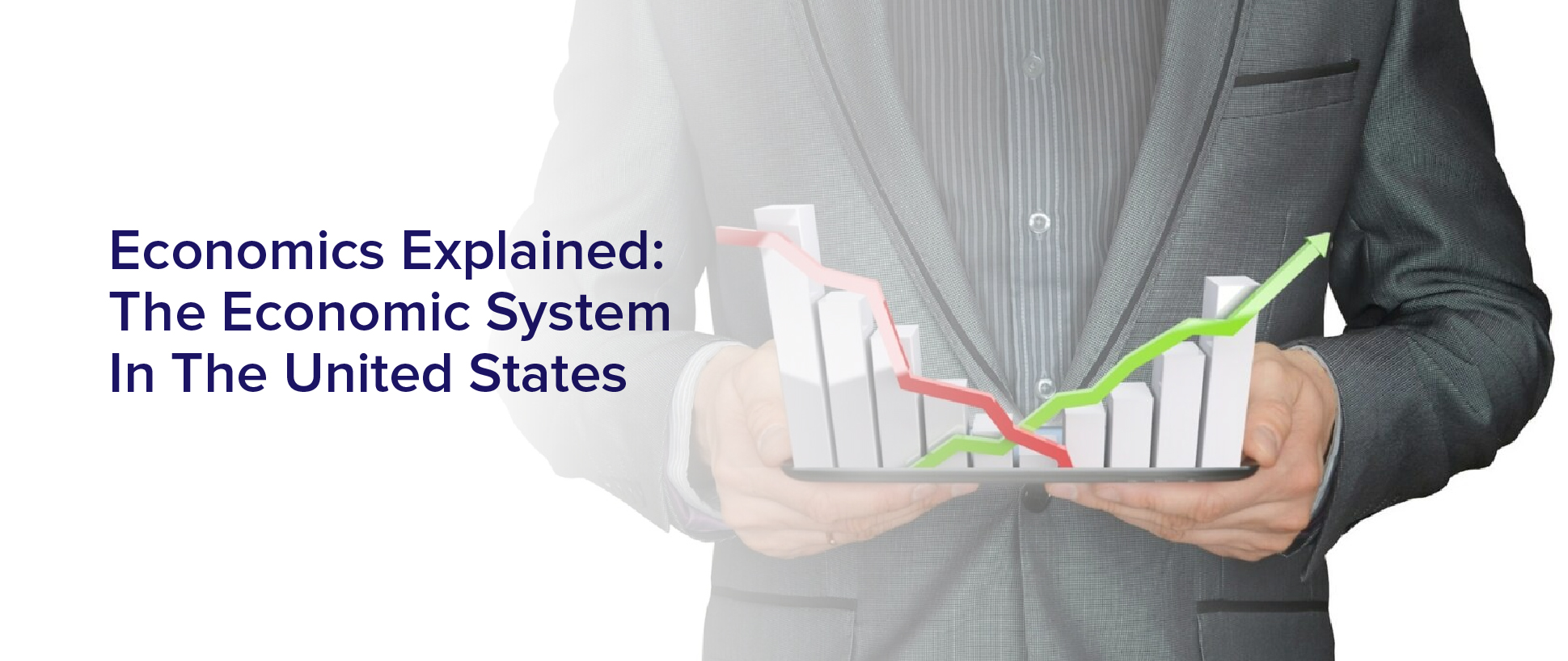Do you ever wonder how the economy in the United States operates? The economic system in the US is a mixed economy, meaning it incorporates elements of both capitalism and government intervention. Understanding this system can help you make informed decisions about your own finances and better comprehend the policies that affect our country as a whole.
Capitalism plays a significant role in the American economic system, with private businesses and individuals operating in a competitive market to produce goods and services. However, the government also intervenes in the economy by enacting regulations and providing services like education and healthcare.
By exploring the basics of this mixed economy, you can gain a deeper understanding of the various forces at play in the US economy and the impact they have on our daily lives.
The Basics of a Mixed Economy
You’re living in the United States, where the economy is a mixture of private enterprise and government intervention. This means you’ll see both private companies and government agencies working together to keep the economy running.
The United States has a mixed economy, which means that it has both capitalist and socialist elements. This type of economy is designed to balance the benefits of a capitalist system, such as innovation and competition, with the benefits of a socialist system, such as social welfare programs and government regulations.
Private enterprise is the foundation of the American economy, with private companies providing goods and services to consumers. However, the government also plays a significant role in the economy, regulating businesses, providing public goods and services, and redistributing wealth through taxes and social welfare programs.
The government’s role in the economy is often controversial, with some arguing that it stifles innovation and limits individual freedom, while others argue that it is necessary to ensure that everyone has access to basic necessities and that the economy functions fairly. Regardless of your opinion, understanding the basics of the mixed economy is essential for understanding the economic system in the United States.
Capitalism in the United States
If you’re living in the US, capitalism is the economic model that dominates the country and shapes the way businesses and individuals operate.
Capitalism is an economic system where the means of production, distribution, and exchange are primarily owned and controlled by private individuals and businesses.
This means that individuals and businesses have the freedom to produce and sell whatever they want, and consumers have the freedom to buy whatever they want.
In the US, capitalism is often associated with the idea of the American Dream, which is the belief that with hard work and determination, anyone can achieve success and prosperity.
Capitalism has been credited with promoting innovation and economic growth, as well as creating jobs and wealth.
However, it has also been criticized for creating income inequality and leading to the concentration of wealth and power in the hands of a few.
Despite these criticisms, capitalism remains the dominant economic system in the US.
Government Intervention in the Economy
To understand how the government intervenes in the economy, imagine you’re walking through a busy marketplace where vendors are selling their goods.
Suddenly, a government official arrives and sets up a table, offering a subsidy to vendors who sell a certain type of product. This is an example of government intervention in the economy.
Government intervention in the economy can take many forms, such as regulations, taxes, subsidies, and spending. The purpose of government intervention is to improve market outcomes by correcting market failures, promoting social welfare, and stabilizing the economy.
However, government intervention can also have unintended consequences, such as creating inefficiencies, distorting incentives, and reducing economic growth. Therefore, the challenge for policymakers is to strike a balance between the benefits and costs of government intervention in the economy.
Private Businesses and Individuals in the American System
Private businesses and individuals play a crucial role in how America’s economy functions. The United States has a capitalist economic system, which means that businesses are privately owned and operated to generate profits. This system encourages competition and innovation, and it allows individuals to pursue their own economic interests.
Private businesses are responsible for creating jobs, producing goods and services, and driving economic growth. They’re motivated by profit, so they strive to create products and services that consumers want and need. This competition among businesses helps to keep prices low and quality high, benefiting consumers.
Individuals also play a significant role in the economy as consumers. They’re the ones who purchase goods and services from businesses, which generates revenue and keeps the economy moving. By making informed decisions about what they buy and where they buy it from, individuals can have a significant impact on the economy as a whole.
The Role of Regulation
You might not realize it, but every time you step into a restaurant or purchase a product, regulations are in place to ensure your safety and protect your rights. The role of regulation in the American economic system is essential.
Regulations are implemented to ensure fair competition, prevent monopolies, and protect consumers from harm. The government agencies responsible for regulation include the Environmental Protection Agency (EPA), the Food and Drug Administration (FDA), and the Federal Trade Commission (FTC).
The EPA ensures that companies do not harm the environment, the FDA ensures that food is safe and effective, and the FTC ensures that companies do not engage in deceptive practices.
Without regulations, the American economy would be vulnerable to exploitation and abuse by companies seeking to maximize profits at the expense of consumers.
Education and Healthcare
Education and healthcare are two fundamental aspects of our lives that directly impact our well-being and the future of our society. In the United States, education is primarily funded by state and local governments, with some federal support. This means that the quality of education varies widely depending on where you live and the resources available to your school district.
Some students have access to top-notch facilities, experienced teachers, and a wide range of extracurricular activities, while others attend schools that are struggling to provide basic resources and support.
Healthcare is another area where access and quality can vary depending on factors like income, location, and insurance coverage. The United States does not have a universal healthcare system, meaning that some people may not be able to afford necessary medical care or may be forced to choose between paying for healthcare and other basic needs.
This can lead to significant disparities in health outcomes and is a major challenge facing policymakers and healthcare providers. Despite these challenges, many people in the United States are working to improve access to education and healthcare, recognizing the importance of these areas to the well-being of individuals and society as a whole.
Understanding Economic Policies and Outcomes in the US
Now, let’s delve into how understanding economic policies and their outcomes can impact your daily life in the US. Economic policies are decisions made by the government that influence the economy.
These policies can affect everything from taxes, interest rates, and regulations to welfare programs, international trade, and labor laws. As a citizen, it’s important to understand how economic policies work and how they can impact your finances.
For example, if the government decides to implement tax cuts, it could result in more disposable income for individuals and businesses, which could stimulate economic growth. On the other hand, if the government raises taxes, it could reduce disposable income and decrease economic activity.
Understanding economic policies can also help you make informed decisions about your investments. For instance, keeping an eye on interest rates can help you decide when to buy or sell stocks or bonds.
Overall, having a basic understanding of economic policies can help you navigate the ever-changing economic landscape and make informed decisions for your financial well-being.
Frequently Asked Questions
How does the economic system in the United States compare to other countries?
When it comes to comparing the economic system of the United States to other countries, there are a few key factors to keep in mind.
For starters, the US has a capitalist economy that is largely based on free market principles and individual enterprise. This means that businesses and individuals have a lot of freedom to make their own decisions about how to operate and what to produce.
Additionally, the US has a relatively low level of government intervention in the economy compared to some other countries. While there are certainly regulations and policies in place, they tend to be less restrictive than in places like China or many European countries.
Overall, the US economic system is often seen as a model for other countries to emulate, although there are certainly pros and cons to this approach.
What impact do natural resources have on the US economy?
Natural resources play a significant role in the US economy. The country is abundant in natural resources, such as oil, natural gas, coal, timber, and minerals. The extraction and production of these resources create jobs, generate revenue, and contribute to the country’s GDP.
Additionally, natural resources support various industries, including agriculture, manufacturing, and construction. However, the reliance on natural resources can also pose challenges, such as environmental concerns and volatile commodity prices.
Overall, the impact of natural resources on the US economy is significant and multifaceted.
How does globalization affect the American economic system?
Globalization has had a significant impact on the American economic system.
As a consumer, you have access to a wider range of products and services from around the world, often at lower prices.
However, globalization has also led to increased competition for American businesses and workers, particularly in industries that are labor-intensive.
This has resulted in job loss and wage stagnation for some Americans.
Additionally, globalization has led to outsourcing and offshoring of jobs, which has further contributed to job loss in certain sectors.
Overall, while globalization has brought benefits to consumers, it has also presented challenges for American businesses and workers.
What role do financial institutions play in the US economy?
Financial institutions play a crucial role in the US economy. They provide a range of services, including lending and investment, that allow individuals and businesses to access capital.
Banks, credit unions, and other financial institutions also help to regulate the flow of money and credit throughout the economy, which can impact everything from interest rates to inflation.
Additionally, financial institutions can provide valuable financial advice and expertise, helping individuals and businesses to make informed decisions about their money.
Overall, financial institutions are a key part of the US economic system and play a critical role in driving growth and prosperity.
How has the US economic system evolved over time?
Over time, the US economic system has gone through various changes. From the early days of agriculture-based economy to the present-day service-based economy, the US has evolved a lot.
The Industrial Revolution brought about major changes in the way goods were produced, and the growth of large corporations led to the rise of capitalism.
The Great Depression of the 1930s saw the government taking a more active role in regulating the economy, and the post-World War II era saw the rise of consumerism.
In recent years, globalization has had a significant impact on the US economy, with the growth of international trade and the outsourcing of jobs.
The US economic system is constantly evolving and adapting to changing circumstances, and it’ll continue to do so in the future.
Conclusion
Now that you’ve got a better understanding of the economic system in the United States, you can see how it functions as a mixed economy with elements of both capitalism and government intervention. Private businesses and individuals play a significant role in this system, but government regulation also plays an important role in ensuring fair competition and protecting consumers.
It’s important to keep in mind that economic policies and outcomes in the US are complex and can be influenced by a variety of factors.
By staying informed and understanding the different aspects of the economic system, you can make more informed decisions and better navigate the economic landscape.



